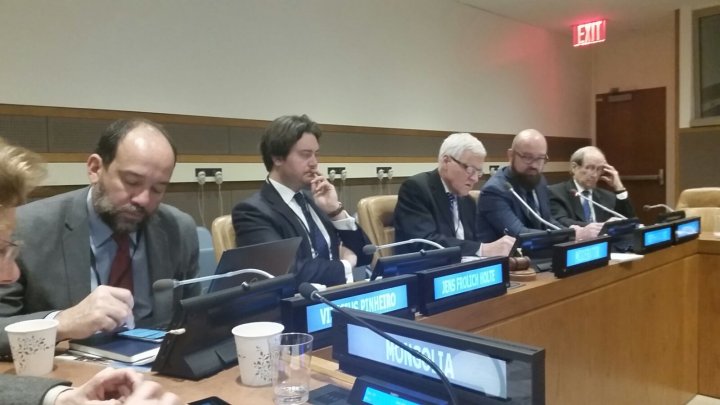The first day of the UN’s Financing for Development Follow-up Forum kicked off to an early start. Peter Bakvis, Director of the ITUC Washington office, moderated a side event entitled ‘Domestic and international financial instruments for financing Universal Social Protection’. Speakers from the governments of Norway, Mongolia, Germany, the ILO were joined by a representative of the Global Coalition for Social Protection Floors to share their experiences, insights and proposals.

The Addis Ababa Action Agenda, adopted in 2015, set out a joint commitment to establish a new Social Compact providing for (1) fiscally sustainable and nationally appropriate social protection systems and measures and (2) essential public services for all (education, health, water, sanitation and other services). This event provided an opportunity to see how States can deliver on these commitments.
The event highlighted the importance of ensuring adequate fiscal space to support social protection. This is particularly pressing as many states have retrenched social protection benefits and services in recent years because of cost concerns. In the discussion, Richard Amparbeng, General Secretary of the Public Service Workers Union (PSWU) of Ghana notably highlighted that “social protection safety nets are threatened by PPPs, which is a form of privatisation, they commercialise essential public services and this limits access and compromises our aspirations to universality”. Trade unions outline that sustainable financing can be ensured through a variety of ways without compromising the adequacy or coverage of benefits, for instance through:
- more redistributive tax systems (e.g., progressive labour taxation, capital gains taxes, financial transaction taxes);
- tackling illicit financial flows and tax evasion;
- re-allocating public expenditures;
- taking measures to increase tax and social security contributions;
- supporting formal employment (which can thereby leverage more tax revenue/social security contributions).
Following this event, the plenary of the FfD follow-up forum was officially opened. The day also saw the launch of the Joint SDGs Fund which was announced in plenary. This new fund aims to support member states in their efforts to accelerate progress towards the SDGs. It will facilitate SDG financing, with both public and private sector partners, through unblocking policy bottlenecks, de-risking investments, and connecting partners to SDG investments that need scale-up. Initial donations were announced from the EU, Sweden, Germany and Spain. The exact modalities of the fund remain unclear, trade unions are particularly vigilant to the blended financing mechanisms which were hinted at. For more information, see The development effectiveness of supporting the private sector with ODA funds.
.@AminaJMohammed announces the launch of the Joint Fund for #Agenda2030 at the #FfDForum. The #JointFund is aimed at unblocking policy obstacles to the implementation of the #SDGs.#Fin4Dev pic.twitter.com/ETxlwHAmw6
— Unions4Dev (@TUDCN_rscd) 23 April 2018
Trade union representatives also attended an event entitled Tackling Illicit Financial Flows: Time to Drop False Solutions and Embrace real Change. With a critical look at the role of the private sector and in particular, the banking sector in facilitating these flows which results in a net transfer of wealth from developing countries, the discussion proved productive.
.@louisestory: follow the money. Where do #IllicitFinancialFlows from #GlobalDev countries end up? We found them in property investments in US cities. #IFF goes one way while #ODA goes the other.#Fin4Dev #FfDForum pic.twitter.com/OvLnjjQcFu
— Unions4Dev (@TUDCN_rscd) 24 April 2018
More information

